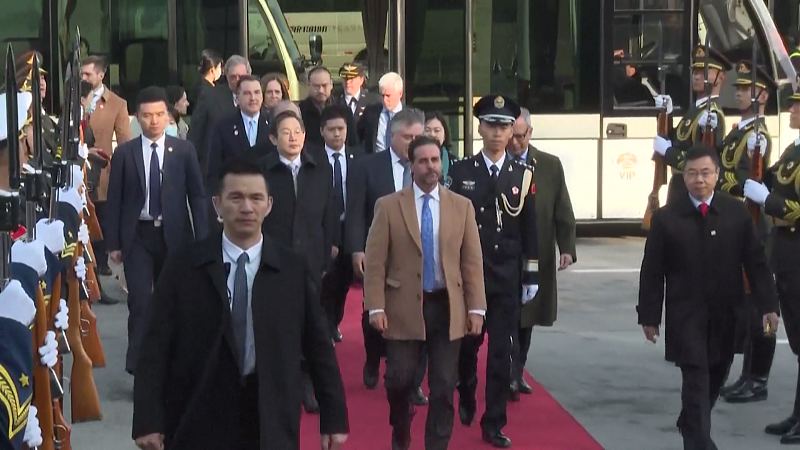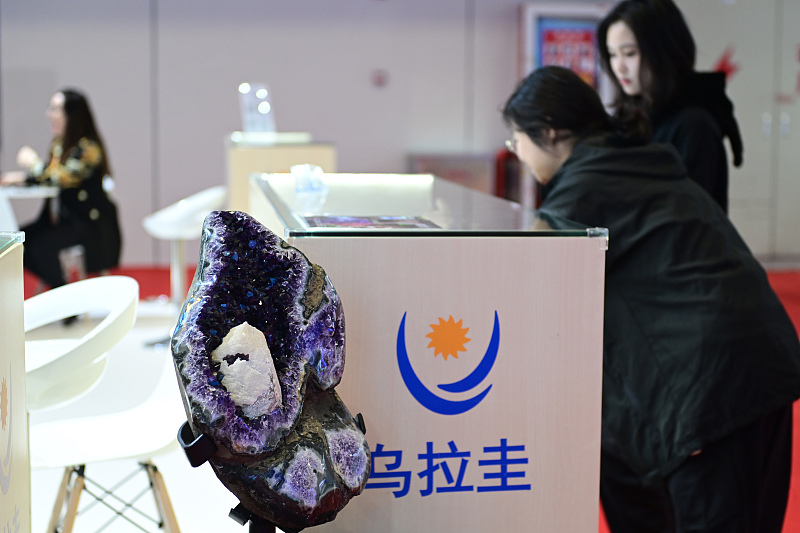
Uruguayan President Luis Lacalle Pou arrives at the Beijing Capital International Airport in Beijing, China, November 20, 2023. /CFP
Uruguayan President Luis Lacalle Pou arrives at the Beijing Capital International Airport in Beijing, China, November 20, 2023. /CFP
Editor's note: Farhad Chowdhury, a special commentator on current affairs for CGTN, is a security and strategic affairs researcher and columnist. The article reflects the author's opinions and not necessarily the views of CGTN.
At the invitation of President Xi Jinping, Uruguayan President Luis Lacalle Pou is in China from November 20 to 24 on a state visit. The visit of the Uruguayan president at this time gave China's vibrant bilateral diplomacy a new dimension amidst the diplomatic dance of China-U.S. relations. The visit's main goals are to enhance the strategic cooperation between the two nations and to fortify diplomatic and commercial ties with China, one of its most important trade partners. A possible free trade agreement, the green economy, trade promotion and digital growth are among the topics of discussion during the visit.
Prior to his meeting with President Xi, Lacalle will attend a seminar on investment prospects. Along with business representatives, the Uruguayan team following Lacalle Pou consists of ministers from the agriculture and fisheries, livestock, industry and foreign ministries. This demonstrates Uruguay's all-encompassing strategy for strengthening its connections with China across a number of industries, suggesting that the two countries' relations are moving into a new phase. Thus, this five-day visit with the aim of finding more ways to improve bilateral commercial and strategic relations is crucial.
Since the bilateral connections were established in 1988, the two nations have strengthened their relationship on the basis of respect for one another and win-win situations. Even though 35 years is a fairly short time, the progress made in ties with China over this period is remarkable. Uruguay and China pledged to become strategic partners in a joint statement they signed in 2016. The president of Uruguay said that Uruguay was fortunate to have China's vaccination support in containing the COVID-19 pandemic. In recent years, China has become Uruguay's largest trade partner. Last year's bilateral trade reached $7.5 billion, a year-on-year increase of 14.9 percent, with an export value of $2.98 billion and an import value of $4.46 billion.
Uruguay's INAC and AF Group's involvement in the sixth China International Import Expo allows Uruguayan cattle, agricultural goods, textiles, jewelry, and cultural tourism to enter Chinese markets, solidifying its status as a significant trading partner for China and marking a new milestone in bilateral ties.

People visit the Uruguay Pavilion at the sixth China International Import Expo in Shanghai, east China, November 9, 2023. /CFP
People visit the Uruguay Pavilion at the sixth China International Import Expo in Shanghai, east China, November 9, 2023. /CFP
Better Beijing-Montevideo relations depend on maintaining trade liberalization and economic globalization, cooperating against protectionist measures, and resisting unipolar economic pressure. In addition to beef, soy and wool, Uruguay also supplies China with whole milk powder and pulp. Young people in Uruguay use a lot of mobile phones and tablets from China. Excellent bilateral links are found in a number of areas, including infrastructure, renewable energy, agriculture, animal husbandry, technology, culture and sports.
Given the recent flurry of intensive diplomatic and business action, Lacalle Pou's visit is crucial in providing a significant boost to ties. Uruguay can benefit from China's modernization, commercial growth, investment impetus and openness. Therefore, collaborating with their Chinese counterparts should be the task of Uruguayan government agencies and enterprises in a professional and effective manner. All of this is made possible by the level of bilateral diplomacy, cooperative attitude, and mutual awareness of regional and global concerns that have been achieved with China.
Relations between China and Uruguay can serve as a model for the rest of the world on how to maintain amicable relations with nations that have distinct political systems as well as significant demographic, geographic, linguistic, historical and cultural differences as those between Uruguay and China.
Uruguay needs to turn its faith in China into "new tools and concrete advantages for both peoples." These seek to fortify and accentuate economic ties, promote trade and tourism, draw in investments, and bolster the nation's image standing. Uruguay seems to be about to undergo a revolutionary transformation, with the possible free trade deal between the two nations being the catalyst. The agreement between China and Uruguay aims to take advantage of fresh possibilities, increase commerce and investment, improve market access, and highlight new prospects in the Southern Cone of Latin America.
To advance the strategic partnership between China and Uruguay, both parties must further solidify their political mutual trust, expand their practical cooperation, foster greater cultural and people-to-people exchanges, step up their collaboration in multilateral affairs, and continue to firmly support one another on matters pertaining to their respective core and main interests and concerns. Together, they can also move forward and produce positive outcomes in their bilateral relations and foster cooperation between China and Latin America under the frameworks of the Mercosur and the Community of Latin American and Caribbean States.
(If you want to contribute and have specific expertise, please contact us at opinions@cgtn.com. Follow @thouse_opinions on Twitter to discover the latest commentaries in the CGTN Opinion Section.)



